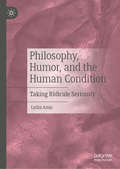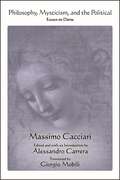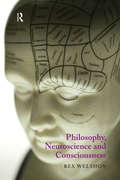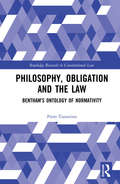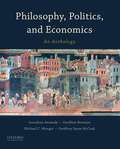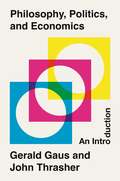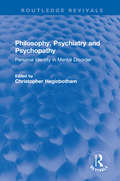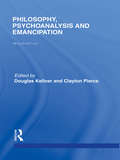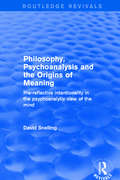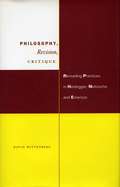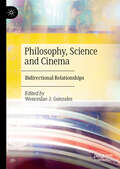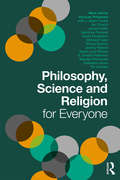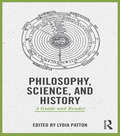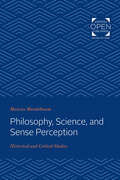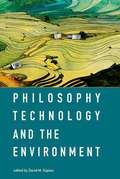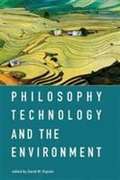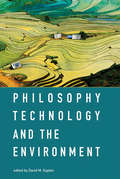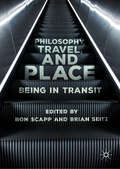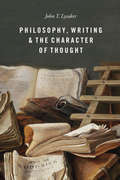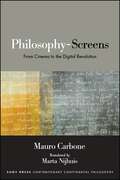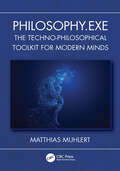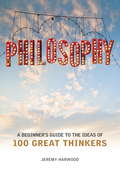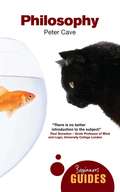- Table View
- List View
Philosophy, Humor, and the Human Condition: Taking Ridicule Seriously
by Lydia AmirThis book presents an original worldview, Homo risibilis, wherein self-referential humor is proposed as the path leading from a tragic view of life to a liberating embrace of human ridicule. Humor is presented as a conceptual tool for holding together contradictions and managing the unresolvable conflict of the human condition till Homo risibilis resolves the inherent tension without epistemological cost. This original approach to the human condition allows us to effectively address life’s ambiguities without losing sight of its tragic overtones and brings along far-ranging personal and social benefits.By defining the problem that other philosophies and many religions attempt to solve in terms we can all relate to, Homo risibilis enables an understanding of the Other that surpasses mere tolerance. Its egalitarian vision roots an ethic of compassion without requiring metaphysical or religious assumptions and liberates the individual for action on others’ behalf. It offers a new model of rationality which effectively handles and eventually resolves the tension between oneself, others, and the world at large. Amir’s view of the human condition transcends the field of philosophy of humor. An original worldview that fits the requirements of traditional philosophy, Homo risibilis is especially apt to answer contemporary concerns. It embodies the minimal consensus we need in order to live together and the active role philosophy should responsibly play in a global world. Here developed for the first time in a complete way, the Homo risibilis worldview is not only liberating in nature, but also illuminates the shortcomings of other philosophies in their attempts to secure harmony in a disharmonious world for a disharmonious human being.
Philosophy, Literature and the Human Good
by Michael WestonIn this provocative new examination of the philosophical, moral and religious significance of literature, Michael Weston explores the role of literature in both analytic and continental traditions. He initiates a dialogue between them and investigates the growing importance of these issues for major contemporary thinkers.Each chapter explores a philosopher or literary figure who has written on the relation between literature and the good life, such as Derrida, Kierkegaard, Murdoch and Blanchot. Challenging and insightful, Philosophy, Literature and the Human Good is ideal for all students of philosophy and literature.
Philosophy, Mysticism, and the Political: Essays on Dante (SUNY series in Contemporary Italian Philosophy)
by Massimo CacciariAmong today's Italian philosophers, Massimo Cacciari is perhaps the most assiduous commentator of Dante. Philosophy, Mysticism, and the Political collects all of Cacciari's writings on Dante to this day, from his masterful analysis of St. Francis of Assisi in Dante's Paradiso and Giotto's frescoes to a new consideration of Dante's "European" idea of empire as a federation of nations, peoples, and languages. Cacciari does not force Dante into any philosophical straitjacket. Rather, he walks with Dante, takes notes, asks questions, raises issues, and tries to understand the Divine Comedy in Dante's terms. Cacciari approaches Dante's Ulysses and the theologico-philosophical vertigo of Paradiso not as a critic but from the point of view of a faithful, assiduous, perceptive, sometimes perplexed, and sometimes worshipful reader. Cacciari's analysis shows once more that Dante does not belong to the past. Dante creates his own age and stays with us whenever we wish to follow his path.
Philosophy, Neuroscience and Consciousness: An Introduction
by Rex WelshonExplaining consciousness is one of the last great unanswered scientific and philosophical problems. Immediately known, familiar and obvious, consciousness is also baffling, opaque and strange. This introduction to the problems posed by consciousness discusses the most important work of cognitive science, neurophysiology and philosophy of mind of the past thirty years and presents an up to date assessment of the issues and debates. The reader is first introduced to the way that consciousness has been thought about in the history of philosophy and psychology. The author then presents an informal and largely non-technical account of the properties of consciousness that are thought to be the most paradigmatic and problematic. Recent scientific work on consciousness, from neurophysiological studies of the brain and evolutionary studies of the development of consciousness to computational theories of the mind are then examined and the philosophical problems that these accounts raise are systematically introduced. The final chapters of the book consider more practical matters by addressing self-deception, neuroses, the unconscious and notions of the self, before concluding with an assessment of the future for psychology and the philosophy of mind.
Philosophy, Obligation and the Law: Bentham’s Ontology of Normativity (Routledge Research in Constitutional Law)
by Piero TarantinoThis book presents a comprehensive investigation of the notion of obligation in Bentham’s thought. For Bentham, obligation is a fictitious – namely linguistic – entity, whose import and truth lie in empirical perceptions of pain and pleasure, ‘real’ entities. This work explores Bentham’s fictionalism, and aims to identify the general features that ethical fictitious entities (including obligation) share with other kinds of fictitious entities. The book is divided into two parts: the first examines the ontological and epistemological foundations of Bentham’s distinction between real and fictitious entities; the second part addresses the normative and motivational aspects of moral and legal notions. This book reveals the centrality of the following issues to Bentham’s legal reform: logic, theory of language, physics, metaphysics, metaethics, axiology, moral psychology, the structure of practical reasoning and action with reference to the law.
Philosophy, Politics, And Economics: An Anthology
by Michael C. Munger Jonathan Anomaly Geoffrey Brennan Geoffrey Sayre-MccordThe only book on the market to include classical and contemporary readings from key authors in Philosophy, Politics, and Economics (PPE), this unique anthology provides a comprehensive overview of the central topics in this rapidly expanding field. Each chapter opens with an introduction that helps students understand the central arguments and key concepts in the readings. The selections encourage students to think about the extent to which the three disciplines offer complementary or contradictory ways of approaching the relevant issues. Philosophy, Politics, and Economics: An Anthology is ideal for undergraduate PPE programs and courses in political philosophy and political economy.
Philosophy, Politics, and Economics: An Introduction
by Gerald Gaus John ThrasherAn updated and expanded edition of the classic introduction to PPE—philosophy, politics, and economics—coauthored by one of the field’s pioneersPhilosophy, Politics, and Economics offers a complete introduction to the fundamental tools and concepts of analysis that PPE students need to study social and political issues. This fully updated and expanded edition examines the core methodologies of rational choice, strategic analysis, norms, and collective choice that serve as the bedrocks of political philosophy and the social sciences. The textbook is ideal for advanced undergraduates, graduate students, and nonspecialists looking to familiarize themselves with PPE’s approaches.Starting with individual choice, the book develops an account of rationality to introduce readers to decision theory, utility theory, and concepts of welfare economics and consumer choice theory. It moves to strategic choice in game theory to explore such issues as bargaining theory, repeated games, and evolutionary game theory. The text also considers how social norms can be understood, observed, and measured. Concluding chapters address collective choice, social choice theory and democracy, and public choice theory’s connections to voters, representatives, and institutions.Rigorous and comprehensive, Philosophy, Politics, and Economics continues to be an essential text for this popular and burgeoning field.The only book that covers the entirety of PPE methodsA rigorous, nontechnical introduction to decision theory, game theory, and positive political theoryA philosophical introduction to rational choice theory in the social sciences
Philosophy, Psychiatry and Psychopathy: Personal Identity in Mental Disorder
by Christopher HeginbothamFirst published in 2000, Philosophy, Psychiatry and Psychopathy was highly topical in tackling the interface of applied philosophy and psychiatry at a time when government and clinicians were giving careful consideration to new forms of treatment for people with psychopathic disorder. The book brings together contributions from lawyers, philosophers, psychiatrists and clinical managers to explore the inter-related conceptual and political implications of Psychopathy. Philosophy, Psychiatry and Psychopathy will appeal to those with an interest in the history and development of theories and research relating to philosophy and psychiatry.
Philosophy, Psychoanalysis and Emancipation: Collected Papers of Herbert Marcuse, Volume 5 (Herbert Marcuse: Collected Papers #5)
by Herbert MarcuseEdited by Douglas Kellner and Clayton Pierce, Philosophy, Psychoanalysis and Emancipation is the fifth volume of Herbert Marcuse's collected papers. Containing some of Marcuse’s most important work, this book presents for the first time his unique syntheses of philosophy, psychoanalysis, and critical social theory, directed toward human emancipation and social transformation. Within philosophy, Marcuse engaged with disparate and often conflicting philosophical perspectives - ranging from Heidegger and phenomenology, to Hegel, Marx, and Freud - to create unique philosophical insights, often overlooked in favor of his theoretical and political interventions with the New Left, the subject of previous volumes. This collection assembles significant, and in some cases unknown texts from the Herbert Marcuse archives in Frankfurt, including: critiques of positivism and idealism, Dewey’s pragmatism, and the tradition of German philosophy philosophical essays from the 1930s and 1940s that attempt to reconstruct philosophy on a materialist base Marcuse’s unique attempts to bring together Freud and philosophy philosophical reflections on death, human aggression, war, and peace Marcuse’s later critical philosophical perspectives on science, technology, society, religion, and ecology. A comprehensive introduction by Douglas Kellner, Tyson Lewis and Clayton Pierce places Marcuse’s work in the context of his engagement with the main currents of twentieth century politics and philosophy. An Afterword by Andrew Feenberg provides a personal memory of Marcuse as scholar, teacher and activist, and summarizes the lasting relevance of his radical thought.
Philosophy, Psychoanalysis and the Origins of Meaning: Pre-Reflective Intentionality in the Psychoanalytic View of the Mind (Routledge Revivals #Vol. 1150)
by David SnellingThis title was first published in 2001. Drawing on recent work in the philosophy of psychoanalysis, and on considerations of the nature of psychoanalytic theory itself, this book reveals new possibilities which psychoanalysis offers for an understanding of the mind - more broadly, the subject of mental states - and its relation to the world. Entailing a re-examination of an approach embedded in the work of certain Continental thinkers, notably Heidegger and Hegel, the connections between philosophy and psychoanalysis presented in this book represent a fresh departure. Linking Kleinian notions of an "inner world" of unconscious phantasy, to philosophical conceptions of non-linguistic meaning whose significance for the psychoanalytic understanding of subjectivity has been hitherto overlooked, Snelling argues that psychoanalysis demands a significant place in our philosophical understanding of ourselves.
Philosophy, Revision, Critique: Rereading Practices in Heidegger, Nietzsche, and Emerson
by David WittenbergPhilosophers have almost always relegated the topic of revision to the sidelines of their discipline, if they have thought about it at all. This book contends that acts of revision are central and indispensable to the project of philosophizing and that philosophy should be construed essentially as a practice of rereading and rewriting. The book focuses chiefly on Heidegger’s highly influential interpretation of Nietzsche, conducted in lectures during the 1930s and 1940s and published in 1961. The author closely analyzes the rhetorical means by which Heidegger repositions Nietzsche’s thinking within a broad history of metaphysics, even as Heidegger positions his own reinterpretation as that history’s more “proper” reading. The author argues that Heidegger’s revisionist project recasts the philosophical text as paralipsis, a special kind of ironic statement that when “properly” received by the philosophical rereader, expresses what the text did not and could not say. The study of such paraliptical revisionism within the philosophical canon offers a new way of understanding the basic historicity of the philosophical text, a text that is critically indistinguishable from its own future history of interpretations. Philosophy itself is revision, a deeply historicist rereading practice, a continuous reappropriation of its own improper textual past. In addition to being the first book-length published study of Heidegger’s interpretation of Nietzsche, the book also examines the work of Hans-Robert Jauss, Harold Bloom, and other critics of revision. In particular, Ralph Waldo Emerson’s early essays on history, read both with and against Heidegger’s analysis of metaphysics, demonstrate why the historical intervention achieved by revisionist reading is not only a formal and thematic alteration of the past, but also a rhetorical coercion of future interpretive tendencies. No philosophical reader is simply a user or victim of revisionist methods: in rereading philosophical pasts, the reader is the very mechanism by which such interpretive tendencies are first formed into problems or thoughts within the philosophical canon.
Philosophy, Science and Cinema: Bidirectional Relationships
by Wenceslao J. GonzalezNow that cinema is offline and online, the capacity of cinema to relate to philosophy and science has increased. In this regard, this book seeks to deepen the relationship between philosophy, science, and cinema in terms of bilaterality. This analysis leads to several successive levels of analysis. First, between philosophy and cinema, where the philosophical perspective bifurcates in several directions, depending on the philosophical branch used. This affects in both directions: from the philosophical orientation to the cinematographic activity and, from cinema, towards the philosophical line used. Second, the relations between science and cinema also go in both directions. Thus, they are modulated by the type of scientific research used and by the film genre employed. Thus, bilaterality is altogether a network of bidirectional relations modulated by various possibilities of analysis.
Philosophy, Science and Religion for Everyone
by Mark Harris Duncan PritchardPhilosophy, Science and Religion for Everyone brings together these great truth-seeking disciplines, and seeks to understand the ways in which they challenge and inform each other. Key topics and their areas of focus include: • Foundational Issues – why should anyone care about the science-and-religion debate? How do scientific claims relate to the truth? Is evolution compatible with design? • Faith and Rationality – can faith ever be rational? Are theism and atheism totally opposed? Is God hidden or does God simply not exist? • Faith and Science - what provides a better explanation for the origin of the universe—science or religion? Faith and physics: can they be reconciled? Does contemporary neuroscience debunk religious belief? Creationism and evolutionary biology - what constitutes science and what constitutes pseudo-science? • Practical Implications – is fundamentalism just a problem for religious people? What are the ethical implications of the science-and-religion debate? Do logic and religion mix? This book is designed to be used in conjunction with the free ‘Philosophy, Science and Religion’ MOOC (massive open online course) created by the University of Edinburgh, and hosted by the Coursera platform (www.coursera.org). This book is also highly recommended for anyone looking for a concise overview of this fascinating discipline.
Philosophy, Science, and History: A Guide and Reader
by Lydia PattonPhilosophy, Science, and History: A Guide and Reader is a compact overview of the history and philosophy of science that aims to introduce students to the groundwork of the field, and to stimulate innovative research. The general introduction focuses on scientific theory change, assessment, discovery, and pursuit. Part I of the Reader begins with classic texts in the history of logical empiricism, including Reichenbach’s discovery-justification distinction. With careful reference to Kuhn’s analysis of scientific revolutions, the section provides key texts analyzing the relationship of HOPOS to the history of science, including texts by Santayana, Rudwick, and Shapin and Schaffer. Part II provides texts illuminating central debates in the history of science and its philosophy. These include the history of natural philosophy (Descartes, Newton, Leibniz, Kant, Hume, and du Châtelet in a new translation); induction and the logic of discovery (including the Mill-Whewell debate, Duhem, and Hanson); and catastrophism versus uniformitarianism in natural history (Playfair on Hutton and Lyell; de Buffon, Cuvier, and Darwin). The editor’s introductions to each section provide a broader perspective informed by contemporary research in each area, including related topics. Each introduction furnishes proposals, including thematic bibliographies, for innovative research questions and projects in the classroom and in the field.
Philosophy, Science, and Sense Perception: Historical and Critical Studies
by Maurice MandelbaumOriginally published in 1964. In four essays, Professor Mandelbaum challenges some of the most common assumptions of contemporary epistemology. Through historical analyses and critical argument, he attempts to show that one cannot successfully sever the connections between philosophic and scientific accounts of sense perception. While each essay is independent of the others, and the argument of each must therefore be judged on its own merits, one theme is common to all: that critical realism, as Mandelbaum calls it, is a viable epistemological position, even though some schools of thought hold it in low esteem.
Philosophy, Technology, and the Environment
by David M. KaplanEnvironmental philosophy and philosophy of technology have taken divergent paths despite their common interest in examining human modification of the natural world. Yet philosophers from each field have a lot to contribute to the other. Environmental issues inevitably involve technologies, and technologies inevitably have environmental impacts. In this book, prominent scholars from both fields illuminate the intersections of environmental philosophy and philosophy of technology, offering the beginnings of a rich new hybrid discourse. All the contributors share the intuition that technology and the environment overlap in ways that are relevant in both philosophical and practical terms. They consider such issues as the limits of technological interventions in the natural world, whether a concern for the environment can be designed into things, how consumerism relates us to artifacts and environments, and how food and animal agriculture raise questions about both culture and nature. They discuss, among other topics, the pessimism and dystopianism shared by environmentalists, environmental philosophers, and philosophers of technology; the ethics of geoengineering and climate change; the biological analogy at the heart of industrial ecology; green products and sustainable design; and agriculture as a bridge between technology and the environment.ContributorsBraden Allenby, Raymond Anthony, Philip Brey, J. Baird Callicott, Brett Clark, Wyatt Galusky, Ryan Gunderson, Benjamin Hale, Clare Heyward,Don Idhe, Mark Sagoff, Julian Savulescu, Paul B. Thompson, Ibo van de Poel, Zhang Wei,Kyle Powys Whyte
Philosophy, Technology, and the Environment
by David M. KaplanEnvironmental philosophy and philosophy of technology have taken divergent paths despite their common interest in examining human modification of the natural world. Yet philosophers from each field have a lot to contribute to the other. Environmental issues inevitably involve technologies, and technologies inevitably have environmental impacts. In this book, prominent scholars from both fields illuminate the intersections of environmental philosophy and philosophy of technology, offering the beginnings of a rich new hybrid discourse. All the contributors share the intuition that technology and the environment overlap in ways that are relevant in both philosophical and practical terms. They consider such issues as the limits of technological interventions in the natural world, whether a concern for the environment can be designed into things, how consumerism relates us to artifacts and environments, and how food and animal agriculture raise questions about both culture and nature. They discuss, among other topics, the pessimism and dystopianism shared by environmentalists, environmental philosophers, and philosophers of technology; the ethics of geoengineering and climate change; the biological analogy at the heart of industrial ecology; green products and sustainable design; and agriculture as a bridge between technology and the environment.ContributorsBraden Allenby, Raymond Anthony, Philip Brey, J. Baird Callicott, Brett Clark, Wyatt Galusky, Ryan Gunderson, Benjamin Hale, Clare Heyward,Don Idhe, Mark Sagoff, Julian Savulescu, Paul B. Thompson, Ibo van de Poel, Zhang Wei,Kyle Powys Whyte
Philosophy, Technology, and the Environment (The\mit Press Ser.)
by David KaplanContributions by prominent scholars examining the intersections of environmental philosophy and philosophy of technology.Environmental philosophy and philosophy of technology have taken divergent paths despite their common interest in examining human modification of the natural world. Yet philosophers from each field have a lot to contribute to the other. Environmental issues inevitably involve technologies, and technologies inevitably have environmental impacts. In this book, prominent scholars from both fields illuminate the intersections of environmental philosophy and philosophy of technology, offering the beginnings of a rich new hybrid discourse. All the contributors share the intuition that technology and the environment overlap in ways that are relevant in both philosophical and practical terms. They consider such issues as the limits of technological interventions in the natural world, whether a concern for the environment can be designed into things, how consumerism relates us to artifacts and environments, and how food and animal agriculture raise questions about both culture and nature. They discuss, among other topics, the pessimism and dystopianism shared by environmentalists, environmental philosophers, and philosophers of technology; the ethics of geoengineering and climate change; the biological analogy at the heart of industrial ecology; green products and sustainable design; and agriculture as a bridge between technology and the environment.ContributorsBraden Allenby, Raymond Anthony, Philip Brey, J. Baird Callicott, Brett Clark, Wyatt Galusky, Ryan Gunderson, Benjamin Hale, Clare Heyward, Don Idhe, Mark Sagoff, Julian Savulescu, Paul B. Thompson, Ibo van de Poel, Zhang Wei, Kyle Powys Whyte
Philosophy, Travel, and Place: Being In Transit
by Brian Seitz Ron ScappThis book continues the exploration of themes either neglected or devalued by others working in the field of philosophy and culture. The authors in this volume consider the domain of travel from the broadest and most diverse of philosophical perspectives, covering everyday topics ranging from commuting and vacation travel to immigration and forced relocation. Our time in transit, our being in transit, and our time at rest, whether by choice or edict, has always been at issue, always been at play (and has always been in motion, if you will), for our species. The essays collected here explore the possibilities of the material impact of being able to move or stay put, as well as being forced to go or prevented from leaving.
Philosophy, Writing, & the Character of Thought
by John T. LysakerLysaker examines the relationship between philosophical thought and the act of writing to explore how this dynamic shapes the field of philosophy. Philosophy’s relation to the act of writing is John T. Lysaker’s main concern in Philosophy, Writing, and the Character of Thought. Whether in Plato, Montaigne, Nietzsche, Wittgenstein, or Derrida, philosophy has come in many forms, and those forms—the concrete shape philosophizing takes in writing—matter. Much more than mere adornment, the style in which a given philosopher writes is often of crucial importance to the point he or she is making, part and parcel of the philosophy itself. Considering how writing influences philosophy, Lysaker explores genres like aphorism, dialogue, and essay, as well as logical-rhetorical operations like the example, irony, and quotation. At the same time, he shows us the effects of these rhetorical devices through his own literary experimentation. In dialogue with such authors as Benjamin, Cavell, Emerson, and Lukács, he aims to revitalize philosophical writing, arguing that philosophy cannot fulfill its intellectual and cultural promise if it keeps to professional articles and academic prose. Instead, philosophy must embrace writing as an essential, creative activity, and deliberately reform how it approaches its subject matter, readership, and the evolving social practices of reading and reflection.
Philosophy-Screens: From Cinema to the Digital Revolution (SUNY series in Contemporary Continental Philosophy)
by Mauro CarboneIn The Flesh of Images, Mauro Carbone analyzed Merleau-Ponty's interest in film and modern painting as it relates to his aesthetic theory and as it illuminates our contemporary relationship to images. Philosophy-Screens broadens the work undertaken in this earlier book, looking at the ideas of other twentieth-century thinkers concerning the relationship between philosophy and film, and extending that analysis to address our experience of electronic and digital screens in the twenty-first century. In the first part of the book, Carbone examines the ways that Sartre, Merleau-Ponty, Lyotard, and Deleuze grappled with the philosophical significance of cinema as a novel aesthetic medium unfolding in the twentieth century. He then considers the significance of this philosophical framework for understanding the digital revolution, in particular the extent to which we are increasingly and comprehensively connected with screens. Smartphones, tablets, and computers have become a primary referential optical apparatus for everyday life in ways that influence the experience not only of seeing but also of thinking and desiring. Carbone's Philosophy-Screens follows Deleuze's call for "a philosophy-cinema" that can account for these fundamental changes in perception and aesthetic production, and adapts it to twenty-first-century concerns.
Philosophy.exe: The Techno-Philosophical Toolkit for Modern Minds (Security, Audit and Leadership Series)
by Matthias MuhlertWe live in an age of unprecedented complexity, where technology, cognitive biases, and societal systems shape our decisions in ways we barely notice. The world is changing faster than our ability to make sense of it. Philosophy.exe is designed to bridge this gap, offering a mental toolkit to help navigate uncertainty, rethink assumptions, and make better decisions in a tech-driven world.Blending classical philosophy, cognitive science, AI ethics, and behavioral psychology, this book provides an adaptive framework for understanding the world. It challenges over-simplified models and rigid ideologies, encouraging readers to embrace complexity as a strategic advantage rather than a threat.What This Book Explores· Complexity Thinking – Why linear logic fails and how to develop a mindset that thrives in uncertainty.· Cognitive Biases & Decision-Making – How hidden mental shortcuts shape our beliefs, and how to counteract them.· Resilience & Mental Adaptability – Tools for maintaining clarity, focus, and critical thinking in a rapidly evolving landscape.· Technology & Human Autonomy – The philosophical and ethical challenges of AI, digital identity, and algorithmic decision-making.· Ethics Beyond Intentions – A pragmatic approach to decision-making that accounts for unintended consequences.Philosophy.exe is for those who seek to go beyond conventional wisdom—whether philosophers, strategists, leaders, or curious minds who question the narratives shaping modern life. It provides the tools to think deeply, adapt quickly, and engage critically in an era dominated by complexity and rapid technological evolution.In a world of misinformation, automation, and uncertainty, this book isn’t just about philosophy—it’s about survival.
Philosophy: A Beginner's Guide
by Jeremy HarwoodFrom philosophy's founding fathers - Thales, Socrates, Plato... to great minds of the post-modern era - Satre, Ayer, Feyerabend... this concise new guide presents 100 of the world's most influential thinkers. Arranged from the ancient world to the present day, each philosopher's key ideas, notable works and pronouncements are encapsulated in a series of succinct biographies, accompanied by illustrations, at-a-glance fact panels and thought-provoking quotations. Philosophy: A Beginner's Guide uncovers the fundamental concepts of this fascinating discipline, explaining the diverging schools of thought and revealing the universal aim of philosophy throughout the ages - to push back the boundaries of human knowledge in order to understand the fundamental nature of human existence. THE ANCIENT WORLD: Thales (c.635-c.543 BCE); Buddha (c.563-483 BCE); Confucius (c.55-479 BCE); Socrates (470-399 BCE); Plato (427-347 BCE); Aristotle (384-322 BCE). THE MIDDLE AGES: Avicenna (Ibn Sina) (980-1037); Peter Lombard (c1100-1160); Averroes (Ibn Rushd) 1126-1198); Thomas Aquinas (1225-1274); William of Ockham (1285- 1349). THE EARLY MODERN ERA: Machiavelli (1469-1527); Hobbes (1588-1679); Descartes (1596-1650); Locke (1632-1704); Voltaire (1694-1778). THE MODERN ERA: Fichte (1762-1814); G W F Hegel (1770-1831); Schopenhauer (1788-1860); Marx (1818-1883); Engels (1820-1895); Nietzsche (1844-1900); Dewy (1859-1952); Max Weber (1864-1920); Gasset (1883-1955); Heidegger (1889-1976). THE POST-MODERN ERA: Marcuse (1898-1979); Karl Popper (1902-1994); Sartre (1905-1980); Arendt (1906-1975); de Beauvoir (1908-1986); A J Ayer (1910-1989); Feyerabend (1924-1994); Rorty (1931-2007). And many more...
Philosophy: A Beginner's Guide
by Jeremy HarwoodFrom philosophy's founding fathers - Thales, Socrates, Plato... to great minds of the post-modern era - Satre, Ayer, Feyerabend... this concise new guide presents 100 of the world's most influential thinkers. Arranged from the ancient world to the present day, each philosopher's key ideas, notable works and pronouncements are encapsulated in a series of succinct biographies, accompanied by illustrations, at-a-glance fact panels and thought-provoking quotations. Philosophy: A Beginner's Guide uncovers the fundamental concepts of this fascinating discipline, explaining the diverging schools of thought and revealing the universal aim of philosophy throughout the ages - to push back the boundaries of human knowledge in order to understand the fundamental nature of human existence. THE ANCIENT WORLD: Thales (c.635-c.543 BCE); Buddha (c.563-483 BCE); Confucius (c.55-479 BCE); Socrates (470-399 BCE); Plato (427-347 BCE); Aristotle (384-322 BCE). THE MIDDLE AGES: Avicenna (Ibn Sina) (980-1037); Peter Lombard (c1100-1160); Averroes (Ibn Rushd) 1126-1198); Thomas Aquinas (1225-1274); William of Ockham (1285- 1349). THE EARLY MODERN ERA: Machiavelli (1469-1527); Hobbes (1588-1679); Descartes (1596-1650); Locke (1632-1704); Voltaire (1694-1778). THE MODERN ERA: Fichte (1762-1814); G W F Hegel (1770-1831); Schopenhauer (1788-1860); Marx (1818-1883); Engels (1820-1895); Nietzsche (1844-1900); Dewy (1859-1952); Max Weber (1864-1920); Gasset (1883-1955); Heidegger (1889-1976). THE POST-MODERN ERA: Marcuse (1898-1979); Karl Popper (1902-1994); Sartre (1905-1980); Arendt (1906-1975); de Beauvoir (1908-1986); A J Ayer (1910-1989); Feyerabend (1924-1994); Rorty (1931-2007). And many more...
Philosophy: A Beginner's Guide (Beginner's Guides)
by Peter CavePhilosophy, the "love of wisdom", is the product of our endless fascination and curiosity about the world - the child of wonder. Through it, we seek to answer the most fundamental of questions: How do we know what we know? Does God exist? What is beauty? How should we live our lives? Who am I?In this exhilarating tour, Peter Cave navigates all the main topics in the subject with verve and clarity, from political philosophy to existentialism. Using witty and whimsical examples, including stoical sofas and Reg, the "regular" human, who just happens to carry his brain in a rucksack, Cave provides a welcome antidote to the dry textbook and underscores philosophy's enduring relevance today. Interspersed with helpful textboxes and mini biographies of the key thinkers, there is no better introduction for the aspiring sage.
